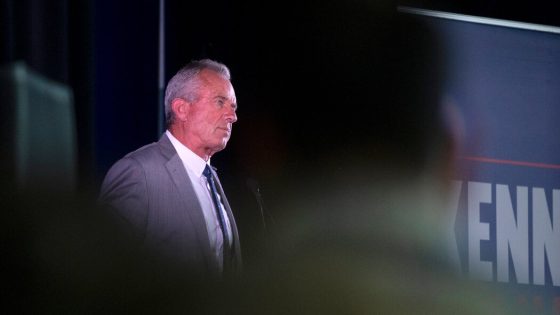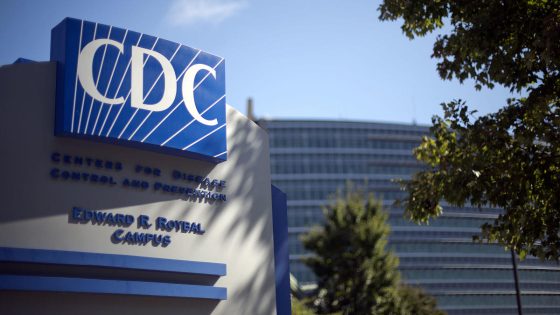When Joseph R. Biden Jr. and Donald J. Trump faced off in the 2020 presidential election, Alexis Figueroa, a hospital worker in Phoenix, would have voted for Mr. Biden, he said, because he seemed like the least controversial of the two candidates.
But with those men back on the ballot in November, Mr. Figueroa is considering a third option: Robert F. Kennedy Jr.
“He’s going after those who are new to voting, the younger generation not being heard,” Mr. Figueroa, now 20, said of Mr. Kennedy, adding that he did not want to vote for Mr. Biden because he did not believe that the president had fulfilled many of his promises.
In a race in which enthusiasm for the top two contenders is low, more Latino voters like Mr. Figueroa are leaning toward third-party candidates, recent surveys show. Mr. Kennedy, who is running a long-shot independent presidential bid, is polling surprisingly well among Hispanic voters in battleground states, pollsters and political observers said, though so far he is officially on the ballot only in California, Utah, Michigan, Oklahoma, Hawaii and Delaware.
Polls show Mr. Kennedy drawing support away from both the Trump and Biden campaigns, but when it comes to Latinos, who overwhelmingly vote Democratic, he may pose a bigger threat to Mr. Biden.
“It’s a trend we see over and over — in a forced choice between Trump and Biden, Biden does better than on a ballot where there are other options,” said David Byler, the chief of research at Noble Predictive Insights, a national polling firm that works in Arizona and Nevada. “For most of this election, his support has simply been softer than Trump’s.”
Voto Latino, an election advocacy group, released its findings on Monday from a wide-ranging survey of 2,000 Latino voters in five critical states: Arizona, North Carolina, Nevada, Texas and Pennsylvania. It found that 18 percent, or about one-fifth, of likely Latino voters were leaning toward a third-party presidential candidate, which the group said was a remarkably high number for this point in the election cycle. Mr. Biden won likely Latino voters overall, but he underperformed compared with 2020 when that third candidate option was on the ballot.
In a hypothetical two-way matchup, Mr. Biden beat Mr. Trump, 59 percent to 39 percent, but his support fell by 12 percentage points when the contest included Mr. Kennedy and two other candidates; Mr. Trump lost only five percentage points and came in at 34 percent.
In interviews, voters, pollsters and strategists said the increase could be attributed to Mr. Kennedy’s name recognition among Latinos — the Kennedy family had strong ties to Latino labor and civil rights leaders like Cesar Chavez. But mostly, the pollsters said, the trend appears to be driven by frustrations among Latino voters — many of whom are young and do not know much about the election — over the two top choices on the ballot.
Mr. Figueroa, and his girlfriend, Raquel Rosario, both Democrats, did not cite the legacy of Mr. Kennedy’s family as a factor in why they were leaning toward his candidacy. Rather, they said they had been disappointed that Mr. Biden had not been able to deliver more on student debt and on better wages. Mr. Figueroa had come across Mr. Kennedy online and was drawn to his talk on health and on banning fast-food products. Ms. Rosario acknowledged, however, that she might change her mind in the fall, because of the hard-line stance Republicans have taken on abortion in Arizona and nationwide.
“It has definitely made Biden look better than Trump,” Ms. Rosario, 19, who works at a children’s museum, said of the issue. “But I think I need to do more of my own research before I decide exactly who I vote for.”
The couple’s views were illustrative of broader trends. The Times’s surveys found that Mr. Kennedy’s popularity was mostly fueled by young voters and social media. Latinos, a diverse coalition of voters that is expected to make up 15 percent of the U.S. electorate in 2024, are largely young and online. In the Voto Latino survey, nearly 60 percent of respondents were younger than 30, and many of them said they wanted to see Mr. Biden do more on the economy, including on inflation and jobs.
Come November, Mr. Kennedy is likely to attract only a single-digit percentage of the total vote, but his popularity matters in a contest that could be decided at the margins in a handful of swing states.
A bright spot for Mr. Biden is that many Latinos know Mr. Kennedy’s brand but not his platform, meaning there is still a lot of time for the president and Mr. Trump to define him. Pollsters also said that a lot could happen in the next five months — after the two presidential debates and the two national party conventions, and once voters have had time to consider the recent criminal verdict against Mr. Trump.
“This race could be different. This could be an outlier,” said Chuck Rocha, a Democratic strategist who helped run Senator Bernie Sanders’s Latino outreach during the last presidential race. But historically, he added, Latino Democrats who flirt with third-party candidates eventually “come home.”
Mr. Kennedy’s outreach to Latinos has not been without incident. The campaign held a California event in March to celebrate Mr. Chavez and galvanize support among Latino voters and organized labor for his bid. Instead, it drew condemnation from Mr. Chavez’s family, who accused Mr. Kennedy of exploiting the Chavez name for political gain.
Asked about Mr. Kennedy’s dragging down Mr. Biden’s numbers, Biden campaign officials argued Latino voters knew that the race was ultimately between Mr. Trump and Mr. Biden.
“Latino voters understand that this election is a clear choice between two very different visions for our country,” Maca Casado, the Biden campaign’s Hispanic media director, said in a statement. It is a contrast that she said the Biden campaign is seeking to underscore.
Ruth Igielnik contributed reporting.
Source Agencies



